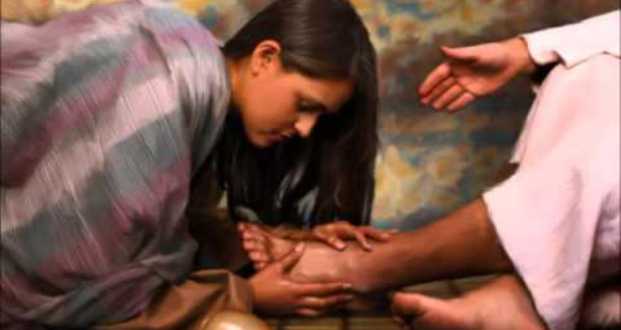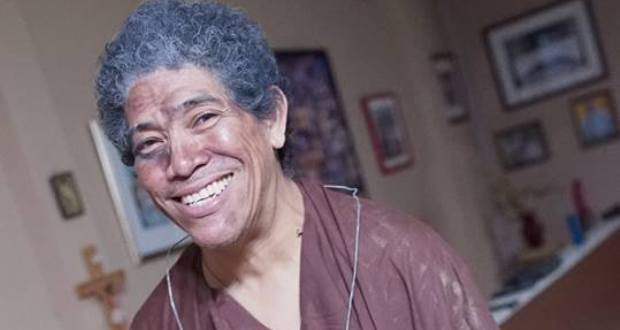The Alabaster Jar – The Passion of Christ – Palm Sunday

This year, The Passion of Christ is being read from Mark’s account of the Gospel. There is a tremendous amount happening in this gospel, and if looked at in a holistic View, very important details that may impact positively on our spiritual journey can be lost. So what I proposed to do over the next few days into Holy Week, starting today, is to focus on one aspect of the Gospel and hopefully at Easter time, I would have been able to cover them all.
The Passion of Christ according to Saint Mark starts at chapter 14 in his gospel. We see that it is on the second day before the Passover and the Feast of unleavened bread, and the chief priests and scribes were looking for some way to arrest Jesus and to put him to death. That’s another way of saying they were looking for some way of bringing false evidence against an innocent man to put him to death. Clearly all that they were doing was underhanded since they did not do it during the festivities because they did not want to create a disturbance among the people. They knew that if they had tried to arrest Jesus, an innocent man, during the festivities where there were lots of his followers around, they would not have been able to do so. The first point to note here is that if we are a people of truth then it would not matter or rather it should not matter when this “truth” is being presented and to whom. So those first two verses alone in Mark chapter 14 challenges us to be people of truth. To be honest in all of our undertakings and to be people of light. Right now in our beautiful twin Island state of Trinidad and Tobago, we have major issues with exactly that, being people of truth; people of honesty and people of integrity.
Mark continues in chapter 14 by describing where Jesus was at that time. He was at Bethany at the house of Simon and he was at table. Now a woman came in with an alabaster jar full of costly ointment. The Bible doesn’t tell us a whole lot about this woman. It does not tell us her name, it does not tell us where she came from, neither does it tell us whether she had any previous encounters with Jesus. The thing is that this woman came with this alabaster jar filled with costly ointment, pure nard, and she poured it out on Jesus. For this woman to have done this, she must have had some life-changing experience with the son of man, Jesus Christ, the savior of the world. No one in their right mind would take something that is costly and literally just pour it out on a circumstance that is of no consequence to them. So maybe this woman was in a crowd somewhere when Jesus was speaking about the Beatitudes. Maybe she was among the multitude that was fed and at that time she knew not where her next meal would come from. Maybe she was at any of those many instances where Jesus healed, where he delivered. Maybe she was the sister of the demoniac that Jesus delivered and made whole. Maybe she was related to one of the many lepers that Jesus healed. Maybe Jesus healed her brother or her son or maybe her father of leprosy – someone whom she longed to be reunited with; someone whom she longed to embrace but couldn’t because of this dreaded disease. But whatever it is, this woman must have encountered Christ in a very real and profound way to have wanted to pour out this alabaster jar of costly ointment on Jesus.
The woman was giving Jesus her all. She was giving Jesus not from what she had left over, but she was giving him all that she had and from the very best that she had. There are a couple stories in the Bible that can be compared to the action of this woman. The first one we can look at is taken from the gospel of St. Luke chapter 21 verses 1 to 4 (also Mark 12: 41-44) where it speaks of the Widow’s Mite and here Jesus glanced up and saw the rich putting their offerings into the treasury, and also a poor Widow putting in two copper coins. At that he said, “I tell you solemnly, this poor Widow has put in more than all the rest. They make contributions out of their surpluses, but she from her all, has given what she could not afford – every penny she had to live on.” In this account, this Widow gave all that she had just as this woman who poured out this alabaster jar of very expensive ointment on Jesus.
The other account that comes to mind that can be compared to the woman who poured out this jar of precious ointment on Jesus is taken from Mark’s gospel chapter 10 – the story of the Rich Young Man. Many bibles have this story with the subheading “The danger of riches.” Here the Rich Young Man comes to Jesus and ask him, good master, what must I do to inherit eternal life? Jesus told him that he should obey the Commandments, to which the man replied that he was already doing this from since his childhood. Then Jesus looked at him and loved him and told him, “There is one thing more that you must do. Go and sell all that you have and give the money to the poor; you will then have treasure in heaven. After that come and follow me.” The Bible tells us that at these words the man’s face fell and he went away sad for he had many possessions. So in this story Jesus challenged this young man who was very rich, to go and sell all that he had so that he can inherit eternal life, which was what he came asking Jesus for. Unfortunately the man was unable to do what it took to inherit eternal life: that is he could not detach himself from his riches. The woman in today’s gospel reading on the other hand had no problem detaching herself from a very expensive alabaster jar of precious ointment because Jesus the Son of Man, the Savior of the world deserves all that we have to give.
What was even more interesting in this story was how the people around reacted to the woman’s outpouring of love and generosity on Jesus. They considered the woman’s action to be extremely wasteful and suggested that the alabaster jar with the perfumed ointment could have been sold and the money given to the poor. In their minds, Jesus did not deserve this! The amazing thing about this is that many of these people I am sure, would have seen the many miracles that Jesus worked, and would have experienced his many teachings, but yet they were completely against this woman’s outpouring of love and generosity to her Master, Lord and King.
Many of us unfortunately, are like these people in the first few verses of this week’s account of The Passion of Christ. Many of us are like that when we attend Holy Mass, assuming the position of passive bystanders in one of the most important and life changing events of our lives, that is the celebration of the Holy Eucharist, and are very critical of those who choose not to be passive bystanders. We are critical of those who are actively involved and who choose to respond to the Eucharist, while we on the other hand offer lackluster responses. The first part of this weekend’s Passion Story challenges us to come out of that state of complacency and to give to Jesus what he deserves, and that is our absolute best. The word of God tells us in the Gospels when Jesus was asked about paying taxes, that we should give to Caesar what belongs to Caesar and to God what belongs to God. We are very very good at giving to Caesar what belongs to him. We are very very good at giving to the world what belongs to the world. However, when it comes to giving to God what he truly deserves we have a problem. The word of God also tells us that unless you become like one of these little ones, unless you become like a child you cannot enter the kingdom of heaven. I have been blessed in doing Ministry in many of our schools here in Trinidad and seeing how the children respond. They gave their all. They hold back absolutely nothing. This is what the first part of this passion story – the alabaster jar challenges us to do – to give to God our all; to give him our absolute best.
Heavenly Father as we continue through these last few days of Lent into Holy Week and towards the celebration of the Sacred Tridium, we ask oh God that you will so infuse us with your Holy Spirit that we will spare absolutely nothing that we can give for your honor and Glory. We make this prayer through Christ Our Lord. Amen.






